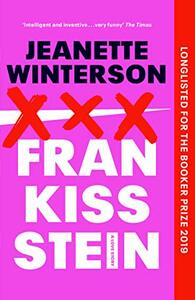Take a photo of a barcode or cover
This book is gimmicky at best and transphobic at worst. I love everything I have read by Jeanette Winterson before this book, and I think this story would have been very interesting if it focused on Mary Shelley and Ada Lovelace, but the writing about the trans character is beyond cringe-provoking. I’m not sure what would motivate a writer of such breathtaking literary works as Oranges are not the only fruit, The Passion, Sexing the Cherry, and others to put this book into the world when it was so unnecessary a thing.
Clever take on Frankenstein. I LOVED the parts featuring Mary Shelley. The modern story was believably creepy! This was published in 2019, but so interesting that Frankenstein continues to resonate (see Poor Things!) Now on to reread the original Frankenstein.
This book was just as interesting and beautiful as I expected. Winterson is a master of multiple narratives and the meta-textual fantasy mixed with sci-fi self-awareness was so cool. Really enjoyed the transhumanism and narrative play, and how she updates the Frankenstein premise while paying attention to the implications/details of the original.
Zeitgeist the novel!
Trans issues combined with AI and politics. Interspersed with a fictionalised autobiography of Mary Shelley.
It's a mixed bag of great ideas, high comedy, and beautiful ... https://shkspr.mobi/blog/2019/09/book-review-frankissstein-by-jeanette-winterson/
Trans issues combined with AI and politics. Interspersed with a fictionalised autobiography of Mary Shelley.
It's a mixed bag of great ideas, high comedy, and beautiful ... https://shkspr.mobi/blog/2019/09/book-review-frankissstein-by-jeanette-winterson/
so disappointing on so many levels...the premise is really interesting! a dual narrative: one follows mary shelley beginning in 1818, one follows a trans doctor (ry shelley) in his relationship with an AI scientist and transhumanist (victor stein). the relationships between transness and frankenstein, between transness and AI, between transness and transhumanism, transhumanism and AI etc. are and have been rich for theoretical and creative exploration and work.
however, it is abundantly clear that winterson has not engaged meaningfully with that work, especially with regard to transness. it is abundantly clear that winterson has barely engaged with transness period, because her perceptions and representations of trans ideation and embodiment are deeply transphobic (obsession with ry's "two inch long clitoris" to which she refers at least twice, constantly undermining ry's manhood by referring to his "biological femaleness" or "female body," extended discussion of how much bodily harm transition does to ry, etc.). she also, i learned, came out against gender affirming care for youth after writing this book, which tracks.
there are also some serious flaws with the form and writing of this book— all of the characters kind of sound the same and they're hard to differentiate because winterson doesn't use quotation marks, the conclusion of the book is sort of abrupt and poorly justified, and
it's grasp on AI feels slippery at times.
all that said, the early chapters of the book which follow mary shelley's writing of frankenstein were interesting, well-contextualized, and well-conceived.
all in all, you'd be better reading mary shelley's frankenstein, reading susan stryker's "my words to victor frankenstein above the village at chamounix," and listening to "dumbest girl alive" to get some sense of how intertwined frankenstein, transness, and cyborg embodiment are.
however, it is abundantly clear that winterson has not engaged meaningfully with that work, especially with regard to transness. it is abundantly clear that winterson has barely engaged with transness period, because her perceptions and representations of trans ideation and embodiment are deeply transphobic (obsession with ry's "two inch long clitoris" to which she refers at least twice, constantly undermining ry's manhood by referring to his "biological femaleness" or "female body," extended discussion of how much bodily harm transition does to ry, etc.). she also, i learned, came out against gender affirming care for youth after writing this book, which tracks.
there are also some serious flaws with the form and writing of this book— all of the characters kind of sound the same and they're hard to differentiate because winterson doesn't use quotation marks, the conclusion of the book is sort of abrupt and poorly justified, and
it's grasp on AI feels slippery at times.
all that said, the early chapters of the book which follow mary shelley's writing of frankenstein were interesting, well-contextualized, and well-conceived.
all in all, you'd be better reading mary shelley's frankenstein, reading susan stryker's "my words to victor frankenstein above the village at chamounix," and listening to "dumbest girl alive" to get some sense of how intertwined frankenstein, transness, and cyborg embodiment are.
There’s a lot that’s great about this book. If you’re an American, I strongly caution against listening to the audiobook, as the narrator for Ry cannot do an American accent and it’s hugely distracting. For fans of AI, transhumanism and Mary Shelley, there’s a lot to like. I’m not sure how well-managed or respectful this is of trans characters, I’ve seen some criticisms. I do think that all the characters were drawn as unique individuals, which I liked. I could have done with a little less on sex-bots, but there’s a lot of empathy as well as humor throughout the book for all types of people.
Läs min recension på bloggen: https://www.fiktiviteter.se/2020/10/22/frankissstein-av-jeanette-winterson/
I was v excited to read this, especially as it was soon after reading Frankenstein for the first time.
I really enjoyed the Mary Shelley chapters, but that was it. These chapters were why I carried on reading till the end. My favourite part of the book is this response by Mary Shelley to her husband.
“He looked up. He ceased to read aloud. Mary! You have held me there. I am writing a poem about Peterloo. A poem of revolution and liberty and I want it read to men and women everywhere who are brave enough to demand freedom.
Have we got any cheese? I said.”
However.
A lot of the language used to describe Ry, by themselves and other characters made me feel uncomfortable. I wasn’t sure whether this book was a story of transphobia, or whether it was transphobic. But when the romance/sex scenes started, it became clear that this trans character was being fetishised - not just by characters but the author too. Repetitive descriptions of their genitals became v boring and the words used to describe them (Ry) were becoming more and more offensive.
I really enjoyed the Mary Shelley chapters, but that was it. These chapters were why I carried on reading till the end. My favourite part of the book is this response by Mary Shelley to her husband.
“He looked up. He ceased to read aloud. Mary! You have held me there. I am writing a poem about Peterloo. A poem of revolution and liberty and I want it read to men and women everywhere who are brave enough to demand freedom.
Have we got any cheese? I said.”
However.
A lot of the language used to describe Ry, by themselves and other characters made me feel uncomfortable. I wasn’t sure whether this book was a story of transphobia, or whether it was transphobic. But when the romance/sex scenes started, it became clear that this trans character was being fetishised - not just by characters but the author too. Repetitive descriptions of their genitals became v boring and the words used to describe them (Ry) were becoming more and more offensive.
After reading and loving [b:Oranges Are Not the Only Fruit|15055|Oranges Are Not the Only Fruit|Jeanette Winterson|https://i.gr-assets.com/images/S/compressed.photo.goodreads.com/books/1267717580l/15055._SY75_.jpg|1411520] when it first came out in 1985, I shocked myself by DNF'ing every subsequent Winterson I tried. Her writing had a kind of hothouse romanticism that turned me off. But now my DNF Winterson streak is over! The warmth and wit that I loved in Oranges is back and put to work empathically envisioning Mary Shelley in her own time, and then slicing, dicing and morphing Shelley, her companions, and her existential ideas into a near-future 21st century story.




